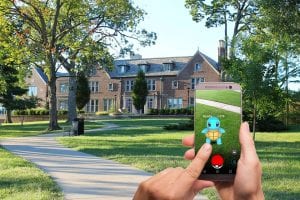The developer of the popular Pokémon Go game, Niantic, recently agreed to settle a lawsuit with disgruntled homeowners who were tired of players hanging out at PokéStops near their homes.
Earlier this month, Niantic, the developer of the popular Pokémon Go game, agreed to a lawsuit settlement with homeowners who had “PokéStops placed near their homes.” As part of the agreement, Niantic made some minor game changes that are expected to “make life easier for people who find unwanted Pokémon Go players around their homes.” However, the settlement fails to resolve some of the bigger questions regarding physical property laws and augmented reality.

What kind of changes did the developer make to the game, though? For starters, Niantic implemented “several new features and policies.” While homeowners “can already have pokémon gyms or PokéStops removed from private property,” the new changes make it so if homeowners file complaints about unwanted PokéStops near their homes, their complaints will be resolved within 15 days. Additionally, the new changes also promise to “remove any stop that’s located within 40 meters of that property and maintain a database that will prevent a new gym or PokéStop from popping up nearby.”
Homeowners aren’t the only ones benefiting from the new policies and features, though. In fact, even park authorities will have the ability to request “that gyms and PokéStops only appear during open hours.”
Additionally, Niantic also added a warning system for players. For example, if more than 10 players “show up for a raid in Pokémon Go, “a message will flash on their screens, reminding them to be courteous to others and respectful of their real-world surroundings.” Similar warning messages will also pop up on player’s mobile devices when they launch the game.
The settlement agreement also includes the possibility of financial damages, “including $1,000 each for the people named in the lawsuit.” However, Niantic has yet to agree on a specific number.
The settlement stems from a class-action lawsuit that was filed back in 2016 after Niantic received several multiple complaints from disgruntled homeowners. According to the complaints, “Niantic’s game had encouraged players to trespass on their property, sometimes blocking their driveway with cars, ‘peering into their windows,’ and littering or damaging property.”
Pokémon Go was and remains to be a popular alternate reality game played on mobile devices. Since its development, Pokémon Go has revealed “many pitfalls in location-based games, including players who trespassed or took risks to find hard-to-reach pokémon, or PokéStops being placed in inappropriate locations like cemeteries and memorials.” However, this recent settlement hopes to show that, with better policies and rules in place, similar games can be played respectfully “without bothering nonplayers…even if it doesn’t establish a legal precedent for regulating digital space.”
Sources:
Niantic is tweaking Pokémon Go to settle a lawsuit with angry homeowners


Join the conversation!